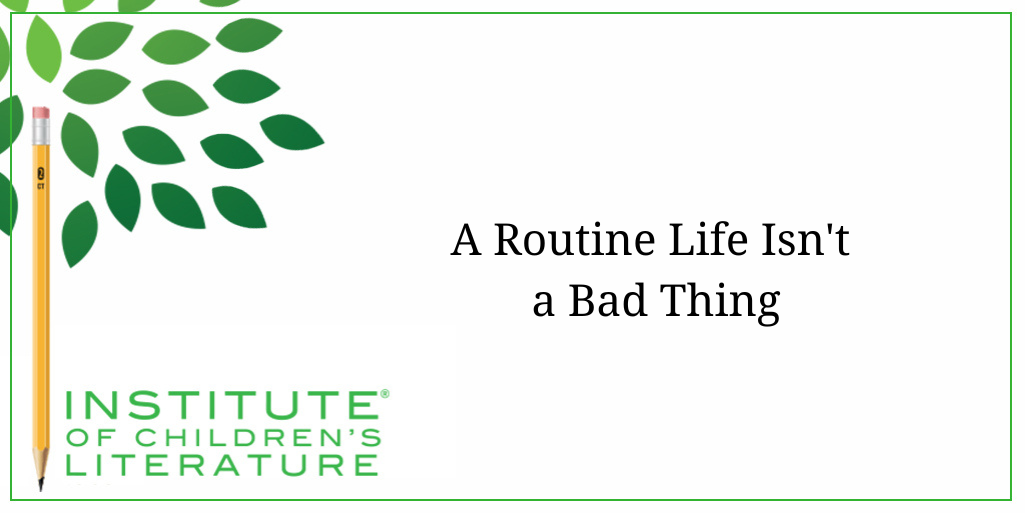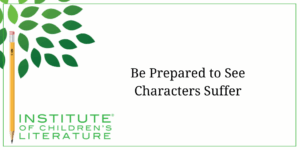
- Date: February 20, 2025
- Author: Jan Fields
- Category: Writing for Children Blog
- Tags: goals, habit, inspiration, routine
We teach our students how to write and get published!
View our Course Catalog >
A Routine Life Isn't a Bad Thing
As a person whose brain is wired a little differently from most, I am very fond of routines. In fact, a free and easy day when I'm not tied to any schedule leaves me feeling a little nervous. I can change my routine, but not spontaneously. Still, even with my love of schedules, I have found that there is a huge difference between a good one and an unproductive one. So, I'm working more and more toward a good one.
What makes a good routine? For one, it's personal. My schedule probably wouldn't work for anyone reading this essay. And yours wouldn't work for me. That's something I had to accept. I'd hear of writers who wrote every single day and got so much done and managed all this other side stuff, and I'd feel down about my own accomplishments. But each of us is on our own journey, and we each have our own challenges. It's better not to compare yourself to anyone else. Instead, we're better served to focus on ourselves, on what we need, and on what we can accomplish. 
A Whole Pie or a Slice
When I was raising my daughter, my writing routine was a fairly small slice of my overall day's plan. My daughter needed the bulk of my time. And my husband needed some too. These days my daughter is grown and working in the library she always loved, but my husband still needs my time, especially as he has health issues. Caregiving is a hungry time gulper.
As a result, when I'm working on my writing schedule, I recognize that I'm dealing with only a slice of my overall schedule. That can be frustrating if you let it. It can also easily become an excuse, a reason for not accomplishing those writing tasks we really desire. If we cannot have the whole day to write, we feel like we can't do anything. But that's not true. And, as writers, we need to tell ourselves the truth.
A well-known novelist once said that we need to remember that if you write one page a day, you'll have a finished novel by the end of the year. In other words, little bits add up. I can't write a novel today. But I can write a page. On a good day, I can write several and do some research on top of that. And if I keep working, and accepting good days and bad, I will end up with a novel, or a short story, or a picture book, or whatever writing goal I'm trying to accomplish.
Because small bits can result in huge accomplishments, we need to understand that the small slice of our routine that can be devoted to writing still counts. It still matters. It is still a vital part of success. Value the small slice, and don't let it be lost in the mass of a busy life.
Be Realistic
Your writing schedule works best when it's possible. In other words, if you're a busy parent with a job, you have to recognize that your writing routine will be squished into a small piece of the daily pie. And some days, it's probably not going to happen at all. As a result, our choice of how to handle that slice will depend on understanding how reality works. So, begin by looking at all the elements in your daily life that cannot be moved or squished or trimmed. Accept those parts and stop feeling guilty or defeated by them.
When you start accepting all the unmovable bits, you might be surprised by how much time they take. Maybe you drive your kids to school. And that happens five days a week and takes a good chunk of your morning. It's also hard to know exactly how much time it will take. Some writers have squeezed writing (or at least brainstorming) into being in pick-up or drop-off lines at school. That might be a possible option for you, but don't feel bad if it's not. You might prefer chatting with your kids or mentally ordering the rest of your day during those lines. And that's fine. Remember, routine is personal. Do what works for you.
 Still, you might realize that every day you leave for the same schools at about the same time as other people in your neighborhood. What if you started a carpool among local parents (or even with just one other parent) and suggest one day a week where you take their kids, and a different day where they take yours. That's the gain of an hour (or more) in your week's busy schedule. Or consider the immovable object of cooking supper. Maybe one day a week, you teach your kids to make supper (even if it's not a culinary masterpiece). These tiny bits of time you pick up can be applied to your writing routine, as long as you're realistic and stay on task so they don't simply get lost in the rest of your daily demands.
Still, you might realize that every day you leave for the same schools at about the same time as other people in your neighborhood. What if you started a carpool among local parents (or even with just one other parent) and suggest one day a week where you take their kids, and a different day where they take yours. That's the gain of an hour (or more) in your week's busy schedule. Or consider the immovable object of cooking supper. Maybe one day a week, you teach your kids to make supper (even if it's not a culinary masterpiece). These tiny bits of time you pick up can be applied to your writing routine, as long as you're realistic and stay on task so they don't simply get lost in the rest of your daily demands.
Prioritize Your Goals
One good way to keep your writing time productive is to prioritize your goals and ongoing projects. I can start a new book every single day. I love starting books. I love starting stories. I love beginnings. They are exciting and full of promise. Anything can happen with the book I'm starting. Unfortunately, I can end up with files of exciting story beginnings (and I have) and no finished stories. Thankfully I've become better about that. I've finished things. I have books in publication.
But that love of starting projects can be a problem, if my writing time isn't planned, and I just do what I feel like or write only what inspires me. Because of my own writing nature, I have to prioritize working on projects that are in process. And I have to do that even though I would rather do only new things. I have also learned that sometimes sticking to the routine and accomplishing my goals can require some outside help.
A Dash of Accountability
Writing groups can be fantastic for adding accountability to a writer's life. In-person groups can forge long-term friendships and offer a solid support system to console and to cheer on. Online groups are more convenient and often make it easier on scheduling as no drive time is involved and members can be from vastly different places. Either way, most writing groups meet at regular times and fitting one into your schedule can be helpful in all sorts of ways. 
One big way is accountability. If you share your writing goals, they can gently push you toward them. They can also cheer with you when you meet them. And they can share their own strategies for getting the writing done. So, a writing group might be a useful addition to your weekly or monthly routine.
Self-Care is Important
When life is busy, it's easy for writing to become just part of the grind. And the grind can wear you out. If every bit of free time is spent on writing, you may find that your actual productivity decreases as your creative well runs dry from simple exhaustion. Burnout is a real problem for those with a busy life. Even when writing became my full-time pursuit, which meant I wasn't trying to steal bits of time to feed to it, I still found myself packing out my routine with all work and no play. I love writing, but when it's the only thing I allow myself to do, I begin to feel the dulling effects of burnout after a time.
 That's why self-care also needs to fit into your schedule. Not every moment of your life needs to be productive. A soak in a tub, a night out with friends, or a few hours curled up on the sofa with a soft blanket and a good book offer their own rewards. Rest and self-care help fill the well of creativity that writers depend upon. Also, too much time spent in front of a computer and banging away on a keyboard has negative effects on your body. So, part of self-care is actual care for your physical body. The most relaxing pursuits have their own productivity because they produce a better, more refreshed, and happier you.
That's why self-care also needs to fit into your schedule. Not every moment of your life needs to be productive. A soak in a tub, a night out with friends, or a few hours curled up on the sofa with a soft blanket and a good book offer their own rewards. Rest and self-care help fill the well of creativity that writers depend upon. Also, too much time spent in front of a computer and banging away on a keyboard has negative effects on your body. So, part of self-care is actual care for your physical body. The most relaxing pursuits have their own productivity because they produce a better, more refreshed, and happier you.
Don't be afraid of routine. But keep in mind that the schedule must serve you, not the other way around. You will only have time for the things that are important to you if you make the time and commit to it. But always keep balance in your life and your routine, so that you can be a creative, productive, and healthy writer on a journey to success.
Related Articles for Writing Routine
With over 100 books in publication, Jan Fields writes both chapter books for children and mystery novels for adults. She’s also known for a variety of experiences teaching writing, from one session SCBWI events to lengthier Highlights Foundation workshops to these blog posts for the Institute of Children’s Literature. As a former ICL instructor, Jan enjoys equipping writers for success in whatever way she can.




